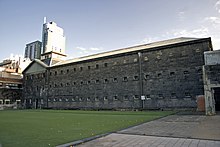gaol
English

Etymology
From Middle English gayole, gajol, gaylle, gaille, gayle, gaile, via Old French gaiole, gayolle, gaole, from Medieval Latin gabiola, for Vulgar Latin *caveola, a diminutive of Latin cavea (“cavity, coop, cage”). See also cage.
Pronunciation
Noun
gaol (countable and uncountable, plural gaols)
- (Commonwealth) Dated spelling of jail.
- 1963, Margery Allingham, chapter 3, in The China Governess[1]:
- ‘[…] There's every Staffordshire crime-piece ever made in this cabinet, and that's unique. The Van Hoyer Museum in New York hasn't that very rare second version of Maria Marten's Red Barn over there, nor the little Frederick George Manning—he was the criminal Dickens saw hanged on the roof of the gaol in Horsemonger Lane, by the way—’
- 2000, J. K. Rowling, Harry Potter and the Goblet of Fire, Bloomsbury Publishing, →ISBN, page 26:
- Sirius had been in Azkaban, the terrifying wizard gaol guarded by creatures called Dementors
Usage notes
Gaol was the more common spelling between about 1760 and 1830,[1] and is still preferred in proper names in some regions. Most Australian newspapers use jail rather than gaol, citing either narrower print width or the possibility of transposing letters in gaol to produce goal.[2] By far the most common spelling in Canada is jail, but a handful of legal writers use gaol; see for example [2], para. 26.
Synonyms
- See also Thesaurus:jail
Verb
gaol (third-person singular simple present gaols, present participle gaoling, simple past and past participle gaoled)
- (Commonwealth) Dated spelling of jail.
Derived terms
Translations
References
- ^ https://books.google.com/ngrams/graph?content=gaol%2Cjail&year_start=1700&year_end=2000&corpus=15
- ^ 1996, Sally A. White, Reporting in Australia, page 275
Anagrams
Irish
Etymology
From Middle Irish gáel (“relationship”), from Proto-Celtic *gailos (compare Lithuanian gailùs (“compassionate”), Gothic 𐌲𐌰𐌹𐌻𐌾𐌰𐌽 (gailjan, “gladden”), German geil (“wanton”)).
Pronunciation
- Lua error in Module:parameters at line 360: Parameter 1 should be a valid language or etymology language code; the value "Munster" is not valid. See WT:LOL and WT:LOL/E. IPA(key): /ɡeːl̪ˠ/, [ɡëːə̯l̪ˠ]
- Lua error in Module:parameters at line 360: Parameter 1 should be a valid language or etymology language code; the value "Connacht" is not valid. See WT:LOL and WT:LOL/E. IPA(key): /ɡiːlˠ/
- Lua error in Module:parameters at line 360: Parameter 1 should be a valid language or etymology language code; the value "Ulster" is not valid. See WT:LOL and WT:LOL/E. IPA(key): /ɡiːlˠ/, (older) /ɡɯːlˠ/
Noun
gaol m (genitive singular gaoil, nominative plural gaolta)
- relationship, kinship; kindred feeling
- relation, kin; relative
- relation between things, connection
Declension
Derived terms
- salachar gaoil (“distant relationship”)
- neasghaol (“next of kin”)
- gaolmhar (“associated; relative, related; cognate”)
Mutation
| Irish mutation | ||
|---|---|---|
| Radical | Lenition | Eclipsis |
| gaol | ghaol | ngaol |
| Note: Some of these forms may be hypothetical. Not every possible mutated form of every word actually occurs. | ||
Scottish Gaelic
Etymology
From Middle Irish gáel (“relationship”). Cognate with Irish gaol.
Pronunciation
Noun
gaol m (genitive singular gaoil, plural gaoil)
- love, affection
- Tha gaol agam ort. ― I love you. (literally, “is love at me on you”)
- Ghabh i trom ghaol air. ― She fell madly in love with him.
- love (object of love)
- “Gaol ise Gaol i [My love is she]”[3]:
- Gaol ise gaol i.
- She is my love.
- (literally, “Love she love her.”)
Declension
Usage notes
- The love expressed by gaol is more intimate in nature than that of gràdh.
Derived terms
Mutation
| Scottish Gaelic mutation | |
|---|---|
| Radical | Lenition |
| gaol | ghaol |
| Note: Some of these forms may be hypothetical. Not every possible mutated form of every word actually occurs. | |
References
- MacBain, Alexander, Mackay, Eneas (1911) “gaol”, in An Etymological Dictionary of the Gaelic Language[4], Stirling, →ISBN
- Colin Mark (2003) “gaol”, in The Gaelic-English dictionary, London: Routledge, →ISBN, page 324
Toba Batak
Noun
gaol
References
- Warneck, J. (1906). Tobabataksch-Deutsches Wörterbuch. Batavia: Landsdrukkerij, p. 70.
- English terms inherited from Middle English
- English terms derived from Middle English
- English terms derived from Old French
- English terms derived from Medieval Latin
- English terms derived from Vulgar Latin
- English terms derived from Latin
- English 2-syllable words
- English terms with IPA pronunciation
- English terms with audio pronunciation
- Rhymes:English/eɪl
- Rhymes:English/eɪl/1 syllable
- English lemmas
- English nouns
- English uncountable nouns
- English countable nouns
- Commonwealth English
- English dated forms
- English terms with quotations
- English verbs
- English terms with mixed convergence
- Irish terms inherited from Middle Irish
- Irish terms derived from Middle Irish
- Irish terms inherited from Proto-Celtic
- Irish terms derived from Proto-Celtic
- Irish terms with IPA pronunciation
- Irish lemmas
- Irish nouns
- Irish masculine nouns
- Irish first-declension nouns
- Scottish Gaelic terms derived from Old Irish
- Scottish Gaelic terms inherited from Old Irish
- Scottish Gaelic terms derived from Proto-Celtic
- Scottish Gaelic terms inherited from Proto-Celtic
- Scottish Gaelic terms derived from Proto-Indo-European
- Scottish Gaelic terms inherited from Middle Irish
- Scottish Gaelic terms derived from Middle Irish
- Scottish Gaelic terms with IPA pronunciation
- Scottish Gaelic lemmas
- Scottish Gaelic nouns
- Scottish Gaelic entries with topic categories using raw markup
- Scottish Gaelic masculine nouns
- Scottish Gaelic terms with usage examples
- Scottish Gaelic terms with quotations
- Scottish Gaelic first-declension nouns
- gd:Love
- Toba Batak lemmas
- Toba Batak nouns
